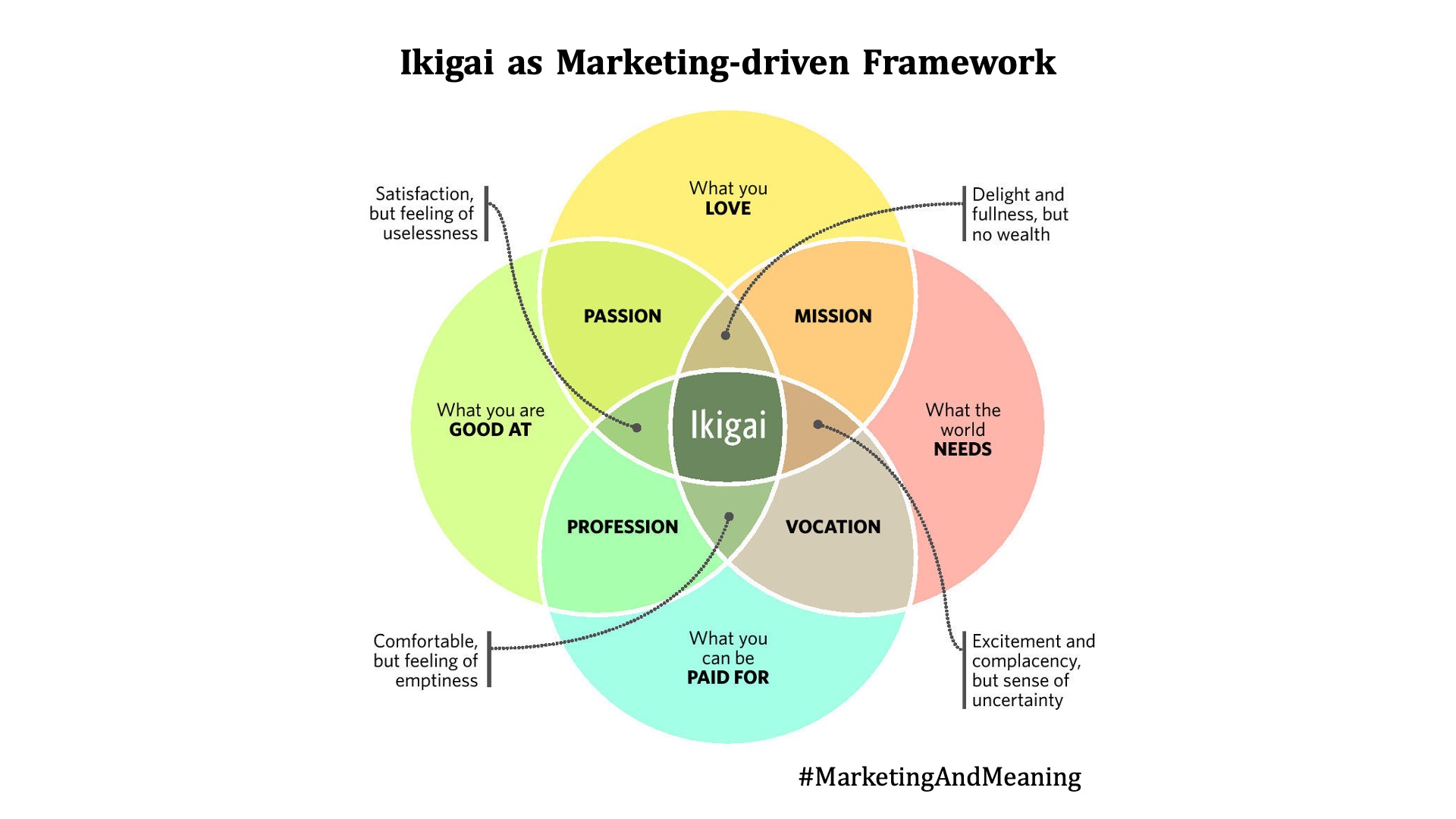

Ikigai in Marketing – A Framework for Brand Differentiation
As a marketer, we all have a common goal: to make our brands relevant and drive revenue. But let’s face it; we often deal with end products already exposed to our audience, with their perceptions and beliefs already set in stone.
How can we differentiate our brands in a crowded marketplace where all brands are near-commodities? Purpose-driven messaging is the ‘easy’ answer. It’s the lever that can set our brands apart from the rest. But how do we achieve this? It’s easier said than done, right?
Outbound messaging is always based on the brand’s inner beliefs and purpose – and needs some soul-searching first.
And this is where the Japanese concept of Ikigai could help.
Ikigai refers to ‘the reason for being’ or, simply put, ‘the thing that gets you up in the morning.’ In the context of marketing, Ikigai can help us identify the unique purpose of our brands and how they can contribute to the world.
By combining four elements: what you love, what you are good at, what the world needs, and what you can be paid for, Ikigai in marketing can help you find your brand’s sweet spot and create a purpose-driven message that resonates with your target audience.
Focus on what you love.
The first aspect of Ikigai involves focusing on what you love. This means finding your passion and infusing it into your brand. When you are passionate about something, it is reflected in your work, and this passion will help drive your brand forward. It could be anything from a particular product, service, or cause that you genuinely care about. By incorporating your passion into your brand, you will create a more authentic and relatable experience for your audience. Passion is infectious, and when your audience sees how much you care about what you do, they will be more likely to connect with your brand.
Consider what you are good at.
The second aspect of Ikigai involves considering what you are good at. This means leveraging your unique skills, talents, and expertise to deliver a superior product or service. When you are good at something, it becomes second nature, and you can do it better than most. This expertise will help you stand out in a crowded marketplace and build customer trust. By showcasing your expertise, you can become a trusted authority in your field, and your customers will be more likely to choose your brand over your competitors. Your unique skills and talents can also help you create a distinctive brand identity that sets you apart from others.
Think about what the world needs.
The third aspect of Ikigai involves thinking about what the world needs. This means identifying a real problem or challenge that your customers face now. By addressing their pain points, you can create a loyal customer base and a lasting impact on the world. Consumers today are looking for brands that are socially responsible and make a difference in the world. By identifying a real-world issue that your brand can solve, you can align your brand with a meaningful purpose and create a more significant impact. This can also help you build a more loyal customer base that feels good about doing business with your brand.
Consider what you can be paid for.
The fourth aspect of Ikigai involves considering what you can be paid for. This means developing a viable business model that generates revenue and sustains your operations. Without revenue, your brand cannot fulfill its purpose or make a difference in the world. Therefore, it is essential to ensure that your brand has a clear revenue stream that is aligned with your passion, expertise, and purpose. By developing a sustainable business model, you can create a foundation that supports your brand’s growth and helps you achieve your goals. It is essential to strike a balance between creating a purpose-driven brand and ensuring its financial sustainability.
I can think of brands like TOMS and Warby Parker that have all incorporated the Ikigai framework in marketing and in their brand messaging, setting them apart from the competition. These brands have a clear passion for something, deliver a superior product or service, address a real problem or challenge, and have a viable business model that generates revenue.
Ikigai could be the framework that brand teams use to drive the conversation among the internal stakeholders, including the highest offices.
While this framework needs to be owned by marketing, we need to ensure that all relevant stakeholders are part of this soul-searching exercise. It will only help us create a meaningful and impactful brand message that connects with our target audience. It can also help you prioritize your marketing efforts, streamline your operations, and foster a sense of purpose and passion among your team.
